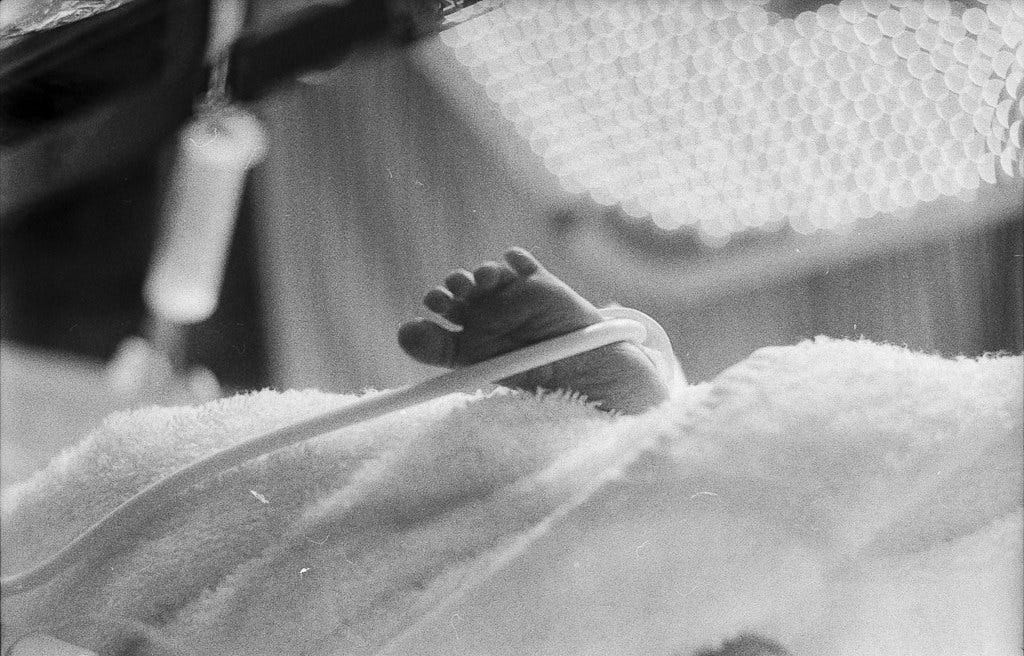Two preemies die, dozens more in peril as Gaza hospital loses power
How many children should die?
I’m easing back from maternity leave, and I’m more committed than ever to write about health and science. So let’s dive in.
One of the biggest health stories on the globe right now is the crisis in Gaza.
Hospitals are running out of electricity, health workers and facilities are being attacked, and thousands of children have reportedly been killed.
I want to talk about all of this. But first:
Israel has prevented deliveries of fuel into Gaza, which means hospitals have lost electricity entirely.
More than three dozen extremely fragile preemies had to be taken out of their incubators because there’s no more power to keep them warm.
Right now, I want you to stop and click that link. Here it is again. The image shows seven impossibly tiny babies piled onto a hospital gurney; behind them is another hospital bed, also filled with very small, very vulnerable babies.
They look exactly like my son, exactly like my daughter, except for one key fact: My son and daughter were only able to leave their incubators for short periods every day. They, like the babies shown above, were too small to regulate their own temperatures. They would die of hypothermia, out in the world.
In Gaza, two of the 39 preemies have already died.
A preemie shown in NICU in 2016. Photo: tonicito
Yet the war continues.
Fighting encircled Al-Shifa hospital over the weekend, yet promised evacuations from the hospital haven’t happened.
Israel says Hamas has command centers under hospitals, a line that the U.S. State Department repeated on Monday. (Hamas previously denied doing this.)
Surgeries, like amputations, are being conducted without anesthesia, on the hospital floor. They’re now burying bodies in mass graves in the hospital complex.
About 160 children are being killed every day in Gaza — more than 4,000 since Israel declared war after the Oct. 7 Hamas attack, where more than 1,400 people were killed — according to the Gaza Health Ministry.
Numbers from that ministry, which is run by Hamas, have been questioned. But international organizations confirm the death toll, while difficult to tally in the moment, is massive.
“The numbers may not be perfectly accurate on a minute-to-minute basis,” says Dr. Michael Ryan of the World Health Organization (WHO). “But they largely reflect the level of death and injury.”
It’s not just bullets and bombs killing Gazans.
A lack of water, fuel, food and safe access to health care is also wreaking havoc. Overcrowding in UN facilities means there is one toilet for 600 people. Infectious diseases, including diarrhea, chicken pox and upper respiratory illnesses, are surging. Typhoid and cholera are probably next.
Since the war began, miscarriages, premature births, and fetal deaths in Gaza have tripled, one doctor says. Some pregnant people are unable even to enter hospitals to give birth.
The UN has pushed to allow chronically ill patients, like those with cancer, to be allowed to leave Gaza because of unsafe conditions and high demand at hospitals.
Neighboring nations have offered to take them in, but so far, only 80 patients or so have been permitted to leave. In previous years, Israel granted permission to about two-thirds of chronically ill patients who asked to leave Gaza to seek medical care.
At least 521 people, including 16 health workers, have been killed in a total of 137 “attacks on health care,” according to the WHO — like the Red Cross convoy that recently came under fire.
Human Rights Watch has decried the attacks on hospitals, medical transport, and health workers, calling for an investigation into possible war crimes.
Last week, CARE International called for the release of hostages, an immediate ceasefire, the ability to deliver aid to Gaza, and the evacuation of the sick and wounded. “This conflict is killing children and robbing millions of their dignity,” said Hiba Tibi, CARE West Bank and Gaza Country Director, in a statement.
I know Israel and Palestine have a long and nuanced history, and I won’t pretend to be an expert on it.
However, I am fairly expert on how many children should die, and the answer is zero. Whether it’s from measles or gunshots, starvation or the cold: Babies. Shouldn’t. Die.
Health workers, the people who are caring for them and for anyone else who needs it, should never have to fear for their lives.
I won’t pretend to know all of the answers. But surely when drawing up the line between right and wrong, we all know which side “dead children” should be on. Right?




